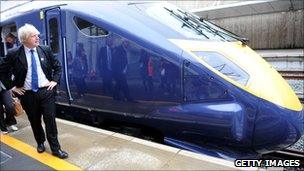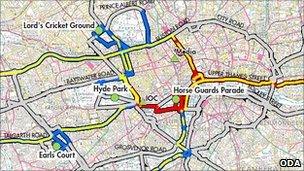London 2012: Transport issues still to be resolved
- Published
Transport has always been highlighted as the key challenge for the London 2012 Olympics.
It scored poorly in the International Olympic Committee's (IOC) initial evaluation in 2004 which described the capital's transport system as "obsolete".
London 2012 is meant to be the "public transport games" with little provision for car parking on the Olympic site. If you have got a ticket for an event you will also be given a special one day travel card.
But considerable issues remain.
The main problem on London's network is the lack of capacity and if you look at Transport for London's (TfL) own estimates, external they have highlighted hot spots where it will take much much longer to get a train.
TfL admits it could take an hour to get on a train at Kings Cross St Pancras station. It is where the special Javelin train will depart for Stratford but the extra crowds would probably affect all services, says TfL.
Clearly, passengers having to queue for that length of time is not acceptable and would be an embarrassment.
TfL needs a 30% drop in commuters to reduce waiting times and it is rolling out a publicity campaign and a series of workshops for businesses. It also wants to encourage commuters to work from home or use different routes.
Without that huge drop in usual commuters the system will struggle to cope but getting Londoners to change their normal routes is a massive challenge and critics doubt it is achievable.
Stratford International
Certainly, the Olympic site itself will be well connected with 10 different rail routes coming into Stratford when the Docklands Light Railway (DLR) link extension from Canning Town finally opens.
That means there will be a direct link between City Airport and the Olympic site. Despite project delays TfL expects it to be ready by the end of the summer.
But some disabled people do still have serious reservations about access at Stratford station itself.
I have filmed wheelchair users having to be hauled off the trains at that station as they cannot get their chairs over the gap between the train and the platform.
If that happens it will be also be an extreme embarrassment for TfL.

The 'Javelin' train will take passengers from St Pancras International to Stratford in seven minutes
The Jubilee Line upgrade has been finally completed although there have been some hiccups resulting in the line being part-suspended on at least on one occasion.
Initially, the upgrade to the Northern Line was meant to be ready for the Olympics, but that is now some way off.
The high-speed Javelin train will be in operation, taking spectators from St Pancras International to Stratford in seven minutes and I get told a lot of positive things about the overground service into Stratford using the rejuvenated and popular East London Line.
However, there are other concerns about rail infrastructure.
If we get hot weather it makes some overhead cables sag in the heat. As we saw recently on the overland rail routes out to Essex and Suffolk, lines had to be closed. The remedy will not be ready in time.
Don't forget, transport systems fail anyway especially when they have extremely old technology as is the case on much of the Tube network.
So, it is inevitable we will see some delays and problems on the Tube during the Olympics.
Olympic Route Network
An area of controversy is the Olympic Route Network. These are the exclusive lanes that will only be used by officials, athletes, IOC members and accredited media.
They have very few supporters, with TfL insiders telling me that the lanes will create huge congestion on the roads.
Black taxi drivers believe they should be allowed into the lanes and are threatening to block them
Some residents in areas like Wapping complain they have not been properly consulted
Residents say they will be cut off by the lanes during the 16-day Games
Pedestrian crossings will also be removed and buses will face long diversions
More congestion could mean more pollution. London has some of the worst pollution in Europe causing thousands of Londoners to die prematurely every year.

Olympic Games Lanes will fast track athletes and officials to venues
While the Mayor of London says he is tackling poor air quality and has been given an extension to comply with EC pollution limits, campaigners say it is not enough and believe it could blight the Games.
Another potential difficulty for TfL is the relationship with the transport unions. Currently, a five-year pay deal with a 4.75% rise in the first year has been turned down by the National Union of Rail, Maritime and Transport Workers (RMT).
There has been talk from hardliners that they want to strike to send a message to management.
But, of course, London is used to dealing with large events and the transport system is key.
As one TfL employee said to me: "Big events are what we're best at and we want to show that ability to the world."
- Published7 July 2011
- Published6 July 2011
- Published2 June 2011
- Published1 June 2011
- Published1 June 2011
- Published15 April 2011
- Published31 January 2011
- Published29 July 2010